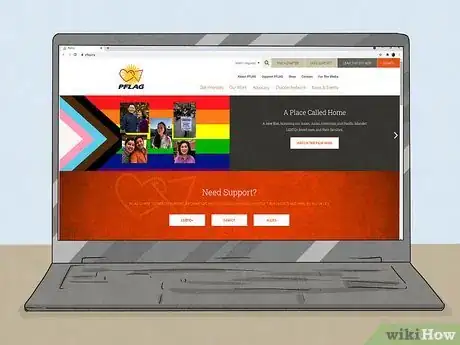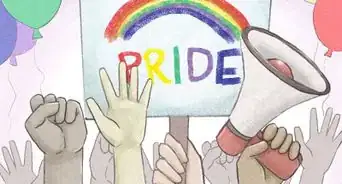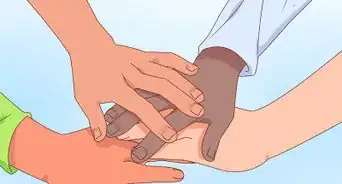This article was co-authored by Lauren Urban, LCSW. Lauren Urban is a licensed psychotherapist in Brooklyn, New York, with over 13 years of therapy experience working with children, families, couples, and individuals. She received her Masters in Social Work from Hunter College in 2006, and specializes in working with the LGBTQIA community and with clients in recovery or considering recovery for drug and alcohol use.
wikiHow marks an article as reader-approved once it receives enough positive feedback. This article received 19 testimonials and 91% of readers who voted found it helpful, earning it our reader-approved status.
This article has been viewed 98,656 times.
A person who is pansexual feels that they can be attracted to a person regardless of that person’s biological sex or gender identity. If you are pansexual, you may wish to tell your parents about your orientation. However, for some parents, this news may be difficult to accept. If you want to tell your parents that you are pansexual, take steps to prepare yourself adequately for the conversation. When you have the conversation, give your parents time to deal with the many complex emotions they may face, and be prepared for a very negative reaction.
Steps
Preparing to Tell Your Parents
-
1Think about why it’s important for you to tell your parents. You don’t have to have a good reason for wanting to tell your parents that you are pansexual, but it may make the conversation go more smoothly if you can identify why it’s important to you that your parents are aware of your sexuality. Whatever the reasons, know that you are a human being that deserves to be loved and respected. Make sure that it is your decision to tell your parents, and that you are not being pressured to tell them by someone else.[1]
- For example, maybe you’ve decided that you never want to have kids regardless of the gender of the person you end up with, so you want them to know what to expect from you.
- Maybe you want to bring around a person that you’ve been seeing for a while, and maybe this person doesn’t fit in with what your parents believe is “normal.”
- Maybe you feel sad that you aren’t being honest with your parents about who you are.
-
2Reflect on your parent’s values. Before you have the conversation with your parents, you should think about their values. Are your parents very religious or very conservative? While neither is a definite indication that they will disapprove of your sexual orientation, a very conservative and very religious parent may have a difficult time dealing with this news.
- While you should be aware of how your parents might react, don’t just assume that it will go well or badly. Just try to think about their values to get a general idea of how they might react.
- Think about any comments they have made about, for example, gay people. Were they positive, negative, or neutral comments? Did they say, “Being gay is a sin!” or did they say something like, “I don’t really understand how someone could be gay, but I guess if that’s how they feel, then that’s how they feel.”
Advertisement -
3Be prepared to explain what pansexual means. Some parents may have never heard the term “pansexual” before. Therefore, be prepared to explain what you mean when you say, “I’m pansexual.” In some scenarios, your parents may have lots of questions for you about what this means and doesn’t mean.[2]
- Being open to talking and explaining your sexuality to your parents may be very important for helping them to understand. Remember, if they are asking questions, it means they are doing their best to understand what is important to you. Do your best to be patient.
-
4Have educational resources available. When you have the conversation, your parents will have to deal with complex emotions based on the information you give them. It may be helpful for them if you can provide them with information about pansexuality, as well as ways they can get support in dealing with your news.[3]
- For example, provide them with the contact information of the group Parents, Families and Friends of Lesbians and Gays, which offers support to the loved ones of the LGBTQ community.
-
5Practice what you want to say. Get right to the heart of what you want to tell them, and practice with a trusted friend or in front of a mirror. You can begin by telling them that you love them, and you are trusting them with this information because you want to have an open and loving relationship with them. Then, just say it. Say something like, “I’ve spent a lot of time thinking about it, and it’s important to me that you know that I am pansexual.”
- Don’t beat around the bush, or you may give the impression that you are ashamed.
-
6Be aware that your parents may think this is just a phase. Although you may be sure about who you are, if your parents don’t want to accept that you are pansexual, they may blow it off as a phase you are going through. There may not be much you can do to change this belief, but over time they will come to see that this is who you are, and that it isn’t a phase you are going through.
- If you are still struggling to understand for certain whether or not you are pansexual it may be wise to put off telling your parents until you have had some time to become more sure. Your parents may be more likely to dismiss what you say if you don’t seem sure, and if you do change your mind about your sexuality, it will help you avoid having a difficult conversation more than once, especially if you are certain they will react negatively.
Having the Conversation
-
1Choose a time and place to have the conversation. If you are not worried that they will be violent with you, you can probably have the conversation at home. If you want to, you could tell them you want to make them dinner one night to discuss something that is important to you. If you are worried about a violent reaction, try to tell them in a public place, such as a park where lots of people spend time with their families.[4]
- Try to plan a good time to tell them rather than doing it spontaneously. Letting them know you need to talk with them about something important in advance may help prepare them for big news.
- Don’t tell your parents when you are having a fight or not getting along well. If you are angry with one another, there is little chance they will take the news well.
-
2Give them time to react. You parents may have already suspected this news, or maybe they didn’t. They may start yelling or crying, or they may be happy. Since there is such a wide range of possible reactions, remember that they may have a lot to say right away, or they may be silent for some time. If they don’t say anything, don’t just start talking to fill the silence.
- They may even get up and walk away. Don’t necessarily assume that this is a bad sign. Just let them go to deal with their own emotions for a while.
- Try to remain calm and respectful. When they are reacting, try not to get angry with them, just do your best to remain rational and honest.
-
3Remember that they need time to accept this information. You probably didn’t wake up one day and just realize that you were pansexual. You shouldn’t expect your parents to accept it immediately either. How much time they need depends on them. Some may accept it right away, some may need a few days, some may never be able to accept it.[5]
- Realize that your parents may experience a feeling of loss. If they had no idea you were pansexual because they truly believed you were heterosexual, then they will have to get to know the pansexual version of you. Don’t take this personally just try to understand that they need some time to grieve for the loss of the person they (mistakenly) thought you were, and time to accept the “new” you.
-
4Be willing and ready to talk. Whenever your parents are ready to talk, be open to them. Try to answer any questions they have about what pansexuality means to you, and how you came to the decision that this is who you are.
- They may ask questions that feel offensive to you. If it seems that they are genuinely interested in trying to understand, and not just trying to embarrass you, then answer them. Help them understand why this is important to you.
- Have the educational resources you prepared ready for them, and offer them up if your parents seem as though they are trying to accept your news, but are having trouble understanding what your news means for your relationship.
Preparing For and Dealing With Very Negative Reactions
-
1Ensure that you will be safe. If you are worried that your parents will be physically violent with you, then tell them in the presence of an adult who is already aware of the situation, such as a school counsellor. If you don’t have that option, tell them in a public place, where people will see if they become violent.[6]
- Your parents have no right to hurt you because of your sexual orientation. If they threaten to kill or harm you, call the police.
-
2Have a place to go. There is really no way to predict how your parents will react. They may kick you out, or they may not. Having a place to stay for a few days to let them mull over what you have told them is a good idea. This doesn’t mean you will absolutely have to stay somewhere else, but if it seems like they need some space, or if they ask you to leave, have a plan about where you will go.[7]
- You could stay at a friends for a few nights, or maybe you can stay with a family member who is aware of the situation.
-
3Understand that they may never accept you. Unfortunately, your parents (or other members of your family) may not be able to accept you for who you are. They may even disown you. If this is the case, remember that it isn’t the end of the world. Stay with the person you planned to stay with in case of this event, and get on with your life. Talk with other family members about your situation, and you may find they accept you. Even if they don’t, eventually you will find a “family” that does accept and love you for who you are.
- If you are under the age of 18 and your parents kick you out of the house, contact the police or child services in your town. They will be able to help you manage your day-to-day life.
- If you are kicked out and alone, call 1-800-RUNAWAY. Tell them about the situation, and they will direct you to the nearest safe house.
Expert Q&A
-
QuestionWhat to do when your daughter tells you she is pansexual?
 Lauren Urban, LCSWLauren Urban is a licensed psychotherapist in Brooklyn, New York, with over 13 years of therapy experience working with children, families, couples, and individuals. She received her Masters in Social Work from Hunter College in 2006, and specializes in working with the LGBTQIA community and with clients in recovery or considering recovery for drug and alcohol use.
Lauren Urban, LCSWLauren Urban is a licensed psychotherapist in Brooklyn, New York, with over 13 years of therapy experience working with children, families, couples, and individuals. She received her Masters in Social Work from Hunter College in 2006, and specializes in working with the LGBTQIA community and with clients in recovery or considering recovery for drug and alcohol use.
Licensed Psychotherapist The best thing you can do is be as supportive as possible. Regardless of what you're feeling right now, it took a ton of courage for your daughter to come out as pansexual, so it's important to show her that you love her, support her, and care about her. It's perfectly fine to ask questions if you have them, just try to be as respectful and loving as you can!
The best thing you can do is be as supportive as possible. Regardless of what you're feeling right now, it took a ton of courage for your daughter to come out as pansexual, so it's important to show her that you love her, support her, and care about her. It's perfectly fine to ask questions if you have them, just try to be as respectful and loving as you can!
Warnings
- If you have two parents, remember that it may be more difficult for one parent to accept your news than the other.⧼thumbs_response⧽
References
- ↑ http://us.reachout.com/facts/factsheet/ten-things-to-consider-when-coming-out
- ↑ http://us.reachout.com/facts/factsheet/ten-things-to-consider-when-coming-out
- ↑ https://www.psychologytoday.com/blog/gay-and-lesbian-well-being/201103/should-you-come-out-your-parents
- ↑ https://www.psychologytoday.com/blog/gay-and-lesbian-well-being/201103/should-you-come-out-your-parents
- ↑ Lauren Urban, LCSW. Licensed Psychotherapist. Expert Interview. 3 September 2018.
- ↑ https://www.psychologytoday.com/blog/gay-and-lesbian-well-being/201103/should-you-come-out-your-parents
- ↑ http://us.reachout.com/facts/factsheet/ten-things-to-consider-when-coming-out
- ↑ Lauren Urban, LCSW. Licensed Psychotherapist. Expert Interview. 3 September 2018.
About This Article
It can be nervewracking to tell your parents you’re pansexual, but if you prepare for the conversation, it’s more likely to go smoothly. Sit down with your parents when they’re not busy or stressed and tell them you have some news to share with them. You might say something like, I wanted to tell you that I’m pansexual, which means I like people regardless of their sex or gender. I’ve felt this way for a while now and I’m hoping you’ll support me.” Your parents may be surprised by the news, so give them some time to take it in and respond. They may also have questions for you about your identity. If your parents are mad or they threaten you, don’t be afraid to leave and go to a safe place, like a friend’s house or even the police. To learn how to talk to your parents after they’ve cooled down, read on.


























-Step-14-Version-2.webp)


















































